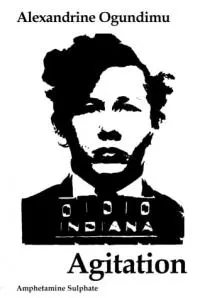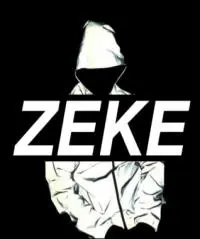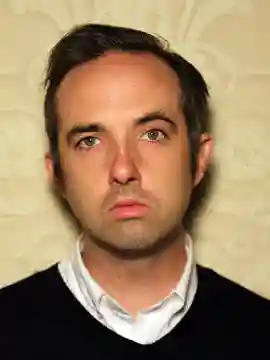Born in Indiana, now thriving in Chicago, Nigerian transgressive author Alexandrine Ogundimu is having a bit of a moment. Agitation (Amphetamine Sulfate) released last month, and she just electronically self-published Zeke (a sharp, fatal revenge story that could be the most harrowing of her oeuvre). Her story “Fascism is Imperialism Applied at Home” is included in Amphetamine Sulfate's Human Rights sci-fi anthology, alongside Thomas Moore, Blake Butler, and Christopher Zeischegg. Ogundimu is also editor-in-chief of Filth, a fierce online journal with a lean towards queer transgressive pieces, and come April 1st, Filth will host a series of live readings in the Chicago area.
In Agitation, you describe Bloomington as “The Paris of Indiana, which is exactly like being The Paris of a toxic garbage island.” What do you mean by this? How important is location to a character like V, who defaults to behavior they’re trying to run from no matter where they go?
“Toxic garbage island” is a reference to the song of the same name by the French death metal band Gojira. So it’s a bit of a pun. Being the Paris of such a place is a massive indignity disguised as a blessing, a false oasis that exists to entrap artists and queers who could probably escape to true freedom if they just went a little further. I stumbled across some apartment listings for Bloomington and the prices were comparable, at this point, to Chicago. So why not just go a bit further?
Location matters for V because even though things are bad for him everywhere, they are worse in some places than they are in others. He becomes something worse in the process of moving from New York to Bloomington. Things intensify, they get more brutal, as a result of him regressing to this state. There is a failure to run from things, and then there is actively courting destruction. V is doing the latter.
In the middle of Agitation, you interrupt the narrative with a great passage: “There’s a transgender narrative in the U.S.”, which reads like a sweeping quirky fairy tale with a happy ending, rather than the Black trans Narrative you insert later, which is much shorter and more bleak. Can you elaborate on how you contrast the two parallels?
White trans women are allowed a greater degree of flexibility and depth and complexity than black trans women, even when their narrative is saccharine and purified to an absurd degree. There’s Denise from Twin Peaks. She’s a bit player portrayed by a man, but she gets to be sapphic and gender nonconforming and a little odd and she ascends to a leadership role in the FBI.
Then you look at any of the girls on Pose, especially Candy, the most trans-friendly show ever, whom despite being portrayed by trans actresses and being given as much dignity as possible, still fall into the same categories black trans women always fall into in fiction: Models, sex workers, nail technicians, corpses. I’m not saying there’s anything wrong with being a sex worker, but I’d like to see more stories where a black trans woman gets a job at a grocery store and goes back to college and meets a nice girl and maybe drinks a bit too much but overall does okay for herself, or a story where a black trans woman gets asked to co-parent her ex’s baby, or where she gets to help solve a murder. I know there’s one now, I believe the woman on it is black, Single Drunk Female or something, and wow look at that, we got one.
My point is, we’re people, not archetypes. The narratives are bullshit, but one is nice bullshit that offers lots of wiggle room, and the other is ugly straightforward bullshit that drives us right into graves. The trans girls of color I know are actually really boring. We write stories or poems and work good jobs.
You’re having a prolific moment, with two short books out within the same month, and a story in the new Human Rights sci-fi anthology (Amphetamine Sulfate). One of the books, Zeke, you chose to self-publish — was there a prompt to get that out immediately, on the heels of Agitation? What are the pros/cons of self-publishing a pay-what-you-will e-book?
Zeke is what happens when a really nice publisher encourages you to write a book, and instead of just publishing it with them you pull it because you’re scared it’ll ruin your reputation because of the content, and then you see your former cohort member getting flowers and accolades and Bloomsbury money for what might be the worst book you’ve seen in print, and then after a long talk with a dear friend, stricken with rage, you say Fuck it and post it on the internet.
The pros? Instant feedback. Cons? It’s free. I’ve made a tenth of what I’d have made going with a small press, if that. It was a harebrained move, and I don’t regret it.
What were some influential books/authors to you when your style was forming? I get a French existentialist feel from your work; intimate yet detached, emotional yet stoic, matter of fact.
I wish I was influenced by French existentialists. The only French writer who informed this work even slightly was Houellebecq, and even then only in the smallest of ways. Glamorama by Ellis is the cornerstone of my style. “Incarnations of Burned Children” by DFW gave me the long sentences and weird time stuff. Joan Didion’s Play It as It Lays haunts every word I write.
Other influences: The band Death Grips, especially the song “On GP,” informed this. Brand New’s last album, Science Fiction. Some overhang from Steve McQueen’s Shame.
In Zeke, we have a young kid who mutually catfishes a pastor and seems curious to explore until the pastor mentions rape and the kid stabs him to death. There’s also a fantasy of patricide in Agitation. Are there ever any righteous reasons to kill? Is this why all literature is so important, so we can express ourselves in the most extreme ways without actually hurting anyone?
I would rather not talk about righteous reasons to kill. Suffice to say, I can think of a plurality.
 I don’t think I’m at risk of ever hurting anyone non-consensually or permanently outside of a life or death situation due to inflexible moral boundaries I’ve developed. There was a time when I liked to fight and I liked to crowd kill at shows. Not anymore. I don’t need this literature as an outlet. Rather, I think it’s beautiful and true. Murders like the ones in Zeke happen so often as to be mundane, and I think there’s something beautiful in a young man, switchblade tucked into his waistband, getting ready to mortally wound this hideous pervert.
I don’t think I’m at risk of ever hurting anyone non-consensually or permanently outside of a life or death situation due to inflexible moral boundaries I’ve developed. There was a time when I liked to fight and I liked to crowd kill at shows. Not anymore. I don’t need this literature as an outlet. Rather, I think it’s beautiful and true. Murders like the ones in Zeke happen so often as to be mundane, and I think there’s something beautiful in a young man, switchblade tucked into his waistband, getting ready to mortally wound this hideous pervert.
The same friend who unwittingly enabled me to post Zeke is a huge fan of extreme horror movies, a love that’s rubbed off on me. They love Wolf Creek 2, I’m a big fan of Raw and Antichrist. We are sort of bound in this. They come from a background of incredible trauma, just the worst, most heinous shit, as bad as anything seen in these kinds of books and movies. I’m a sheltered, if somewhat abused kid from the suburbs. And yet we both love these movies. I think for both of us it’s a coping mechanism, of a different sort. I think there is something in them that is allowed to process great trauma safely, while for me, I have such distance from it that I can view it safely, and it is only from these two vantage points, either right the fuck up in it or from miles away, that the aesthetic value of these horrific occurrences can be appreciated.
I think that’s what people get out of BDSM and MMA. Distance. Control. It’s only the sickest of fucks who can’t get by without being knee deep in it and so turn to assassination, serial murder, law enforcement, special forces.
Do you have a preference for these shorter formats of Desperate/Agitation/Zeke, or is this a ramp up to some novel length work?
Both. I like working short, I always have, and I’ve been encouraged after the positive response to Desperate to keep producing the chapbook length work. It was also a way to finish something in a decent amount of time during the pandemic. But that said, I have a full length coming out next year (The Longest Summer, 2023 Clash Books) and I’m working on novel-length projects right now.
I have the expected attention span of a contemporary American and thus I’ve only read a handful of books over 800 pages long, while I’ve read quite a few under 300 pages. That’s just how it goes for me, and my production follows my reading habits as it does for many people. That said, I have ideas that would be best served in the massive format, ideas involving conspiracies and revolutions and supernatural elements.
How do you see the current state of independent transgressive literature? There’s recently been the argument that the term has become passe, since the world has transgressed past the point of no return, and when you write what you want, you’re not really transgressing anything. But more recently, you made a statement reclaiming the term. Do you see a difference in its LGBTQ roots and how far it’s branched out now? What do you think of those who merely use taboo rhetoric, who somehow call themselves transgressive? What are they missing?
It’s a genre akin to horror. Being caught up on the meaning of the word is pointless, and I say that as someone caught up on that meaning until recently. It’s like extreme metal, or industrial. What the fuck is so “extreme” about Abominable Putridity in today’s world? Is it loud and obscene? So is radio hip hop. My mother wanted to know why it’s called “industrial.” I had to explain that they originally used to sample factory equipment and scrap metal. But today, it’s a guy with six synthesizers and a cocaine problem making slick beats for bored goths to sway back and forth to. So industrial!
And as someone that loves transgressive literature and extreme metal and industrial I realized I seriously needed to get over myself. These are books about crime and vice from the perspective of the perpetrators, with a stark, unflinching, often minimalist lens. That’s it.
The LGBTQ roots of the genre were supposed to be my chosen field of study, but I’ve gotten sidetracked by Afropessimism. Suffice to say, there was a time when we were criminals by virtue of drawing breath, and as such the genre concerned with criminality from the criminal perspective, concerned with transgression against taboos for the sake of transgression itself, was a natural home for the queers. Some of us see ourselves spiritually as criminals still. With all these laws about the transgender kids going around, we might be criminals again here shortly.
 Has it branched out? A bit, but I can still see the queer attitude towards flesh.
Has it branched out? A bit, but I can still see the queer attitude towards flesh.
I’m going to choose to translate “those who merely use taboo rhetoric” as the reactionary element I got into a Twitter huff about. As far as I’m concerned, they’re fakers. Their world already exists: With the exception of a marginally liberal attitude towards gays and the rise of hip hop to surpass rock as the genre of the masses, the fascist dream world is our fine United States. Black people are herded into prisons at gunpoint every day, at a higher rate than anywhere else on Earth. There are concentration camps at the border. Lawmakers legislate transgender people out of public life. Whites continue to dominate all three branches of government and the boards of every major corporation. Cops kill with impunity, except when a big enough stink is made. Even then, dissent is shut down with violence at every turn. We live in a giant surveillance culture where we are encouraged to tell on our neighbors. Even the demographic shift is being handled: Latinx people are being recruited into law enforcement and military positions, just as the Irish were before them.
The American liberal democratic dream and the fascistic one are basically the same, only with the latter you can only listen to shitty synthwave music and folk songs and you get to call black people niggers.
There’s a guy in Human Rights, I won’t say whom, that’s mad on main about “globohomo,” and his piece sits right next to one of mine in the anthology. He got a shout out in the New York Times because he’s part of that new magazine, Contact or whatever. His platform is growing. Where is Maggie Siebert’s New York Times shout out? Jackie Ess couldn’t even get a Lambda nod. But apparently “globohomo” is ruining the world.
That’s the world these people live in. They’re not only free to say what they want, where they want, they’re choosing to do it in the company of the people they inexplicably hate, who were here first. Transgressive fiction wouldn’t exist without Burroughs and Genet and Acker. No one would give two shits about transgressive fiction if it wasn’t for Palahniuk and Ellis, and everyone in the modern scene, myself included, is only someone because they got featured on Dennis Cooper’s blog. Nothing these people write is as intense as Delany’s Hogg. This is our world, and they have been allowed to hang onto it like a tumor on a hustler’s ballsack, swinging for dear life, retweeting each other and pretending to be legitimate. So you’ll excuse me if I laugh when BasedPissBaby1488 is mad that his story “The Octoroon Wench” got rejected from No Trigger Warning Magazine. It was probably a huge piece of shit. Tell him to go outside, rent a Saw movie, eat a grass-fed steak, and tell all the low 4s on Tinder he voted Democrat.
Get Zeke by Alexandrine Ogundimu
Get Desperate at Amphetamine Sulphate

About the author
Gabriel Hart lives in Morongo Valley in California’s High Desert. His literary-pulp collection Fallout From Our Asphalt Hell is out now from Close to the Bone (U.K.). He's the author of Palm Springs noir novelette A Return To Spring (2020, Mannison Press), the dispo-pocalyptic twin-novel Virgins In Reverse / The Intrusion (2019, Traveling Shoes Press), and his debut poetry collection Unsongs Vol. 1. Other works can be found at ExPat Press, Misery Tourism, Joyless House, Shotgun Honey, Bristol Noir, Crime Poetry Weekly, and Punk Noir. He's a monthly columnist for Lit Reactor and a regular contributor to Los Angeles Review of Books.








